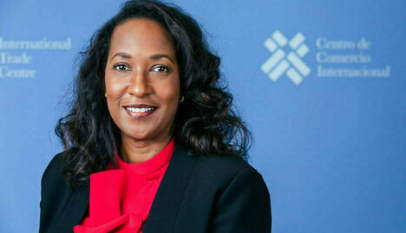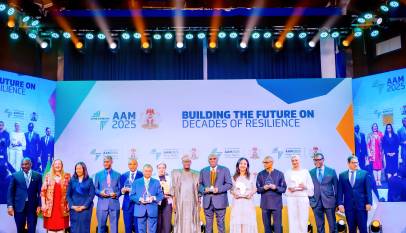INVESTIGATION | Out of school children: Nigeria’s ticking time-bomb
Through the eyes of out of school children, this piece investigates the menace of out-of-school children in northern Nigeria looking at the looming socio-economic and security consequences of the challenge in Africa’s most populous nation
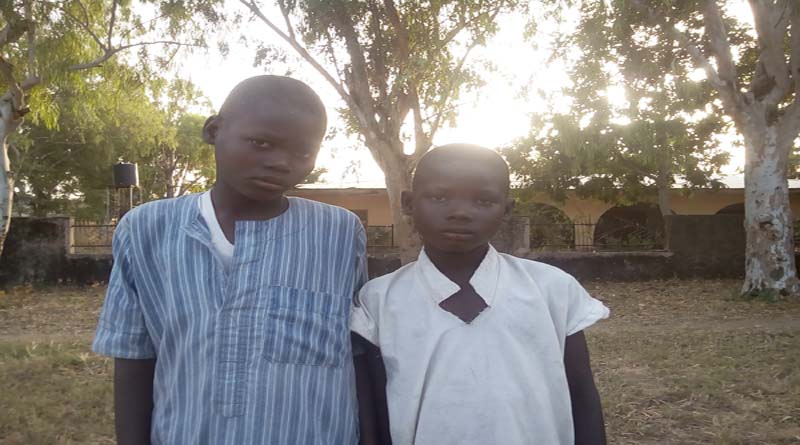
Walking shoulder to shoulder along the well-paved street as the dry harmattan wind blows over Bauchi’s highbrow GRA are two siblings – Sadiq and Nabil – who are on their way to the neigbourhood’s football pitch to play soccer.
Like millions of other boys of their age in Africa and other parts of the developing world, Sadiq [13] and his younger sibling Nabil [11] are lovers of the game of football hence every evening, at around 5pm, they would walk to their community’s football pitch to partake in a game that has been described as world’s most popular sporting activity.
What is discernible about the two children at first sight is: their outlook and dress style is untypical of children who would call the opulent houses that adorn the well-tarred streets in Bauchi’s high-value government reserved area, home. In reality, the brothers do not ‘belong’ in the posh neighborhood – they are born of a security guard father and domestic help mother.
Although the two siblings share a passion for soccer, they are worlds apart when it comes to education: Nabil, the younger sibling attends one of the best public schools in the state of Bauchi in Nigeria’s northeastern region – which had in recent times become infamous for the dreaded Boko Haram insurgency – whereas the older sibling; Sadiq had never seen the four walls of a classroom.
Nabil is not only going to school but also seems to be doing very well, thanks to a scholarship from the owner of the house where his dad, Ibrahim, works as a security guard. On the other hand, Sadiq who is equally passionate about having an education and have even managed to learn how to pen his name is (at the age of 13) still not going to school.
“Whenever I ask my parents to enroll me in school they keep saying I will be enrolled when my father gets his monthly salary or when the next session starts,” says Sadiq in a pitiful voice, staring down as he tries not give in to his emotion .
Therefore, while Nabil learns subjects as varied as Arithmetic, English, Verbal Reasoning, and Quantitative Reasoning amongst others at the Jibrin Aminu Model Primary School, one of only four such special primary schools in Bauchi, Sadiq will be working as an apprentice vulcaniser, patching tubes at a vulcaniser’s workshop behind Nabil’s school.
Education has already made a big difference in the young siblings’ thinking: whereas Nabil’s ambition is to become a Nigerian Air Force officer flying military jets, his older brother’s is to become a tailor, working with thread and needle, tailoring being a trade plied by their grand and great-grandparents.
Others dropping out of school
Whereas the likes of Sadiq have never been to any formal school in their entire lives, his age mate, Usman only recently dropped out of primary school in class 5 because his uniform has worn-out, and could not afford basic learning materials including exercise books. Usman was too young when his mother died to have any memory of her. Besides, he does not know his exact age. His father, Aliyu, who sells eggs for a living has 9 other children to cater for.
“I was attending primary school but my uniform got worn out, I didn’t have books and I was struggling to feed myself so I had to drop out of school,” says Usman, the fourth of his father’s ten 10 children whose family live in Rimin Gata, a suburban community on the outskirts of Kano, Nigeria’s second city.
The fact that Usman’s father cannot afford to send all his 10 children to school and cater for their basic needs like feeding means only 5 of the 10 are currently going to school while Usman and 4 others either dropped out of school or were never enrolled.
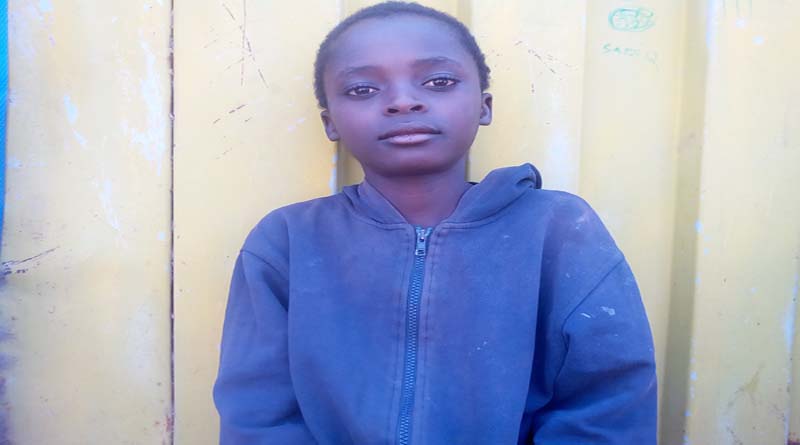
Usman and many other drop-out children in his community – which is host to Bayero University Kano’s new campus – like 17-year old Mustapha survive and were before now paying for their educational needs by running errands for university students. Unlike Usman who lives with his father, Mustapha had only seen his biological father once, in his entire life.
Having divorced Mustapha’s mother while he was still very young, his father had left Kano for Kaduna where he remarried and never bothered to look after or cater for Mustapha and his other sibling’s needs. Mustapha, who was in class 2 at the community’s junior secondary school had to recently quit schooling as he could not any longer cater for his educational needs – with the little he gets from running errands for Bayero’s students .
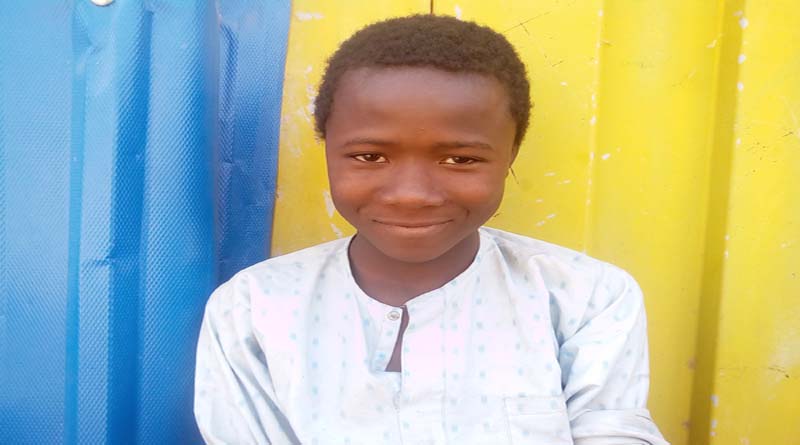
Irresponsible parenting as a cause
Central to the reasons why millions of Nigerian children like Sadiq, Usman and Mustapha are out of school are poverty, ignorance and sheer irresponsibility on the part of parents hence Nigeria’s being the country with highest number of out of school children in the world. According to UNICEF; there are not less than 10.5 million out of school children in Nigeria – 60% of which reside in its northern half.
Poverty means millions of parents in northern Nigeria cannot afford to send their wards to school. Moreover, ignorance on the part of some of them also means they still abhor Western education thus will go to any length to keep their children out of the classroom, even in instances where free education is available.
Moreover, sheer irresponsibility on the part of parents in the region means men would marry, give birth to children they cannot cater for and thus send them to faraway places in the name of a system of Islamic education called Almajirci.
“Men will send their boys to Almajirci; they are literally abandoning them because there is no [effective] supervision by parents. The Mallam (Islamic teacher) can’t cater for them; instead the boys will have to beg to feed themselves and feed the Mallam, as well,” says Amina Hanga, Executive Secretary of the Kano-based Isa Wali Empowerment Initiative (IWEI), a nonprofit working with out of school children in northern Nigeria.
“It is in this process that the boys therefore become vulnerable to social vices: drug abuse, thievery, thuggery. They become vulnerable to being preyed upon by criminals to do as they like with them. So, they grow up hating and resenting society including their parents. This is because their parents and society didn’t give them anything.”
Barriers to girls’ going to school
According to UNICEF, girls account for over 60% of out of school children in Nigeria, majority of who are also from the northern region. Socio-economic barriers such as early marriages, poverty, lack of toilet facilities in schools, insecurity as well as sexual harassment by male teachers in schools are the major barriers for girls’ enrolment and retention in schools across northern Nigeria.
“Men won’t allow their wives to venture out of their homes; instead girls are sent out to hawk on behalf of their mothers to sustain the family. Hawking exposes girls to sexual harassment, risks of getting pregnant as well as contracting STDs like HIV/AIDS. Some parents believe going to school make girls become wayward, therefore the girl-child is send to hawk, after all part of the proceeds will go to funding her wedding,” says Hanga.
Hanga decried the fact these parents don’t understand that an educated girl is less likely to give birth to malnourished children but more likely to have healthy children hence less medical expenses on the family.
Low funding, poor regulation for basic education
The Nigerian government and individual states are still not adhering to UNESCO’s recommended budgetary benchmark of 26% allocation to the education sector, which is responsible for low funding for the critically-important sector. Low levels of funding for basic education means poor quality of education for in-school children and nothing for out of school ones.
“It means greater challenges for the education governance systems at all levels. It also calls for a rethink of our funding for the sector and the strategy for delivery to cater for those out of school,” says Prof. Muhammad Bello Shitu of the Civil Society Action Coalition on Education for All (CSACEFA), a coalition of nonprofits advocating free, quality, and inclusive education in Nigeria.
Furthermore, lack of effective monitoring and supervision means low quality teaching and learning output hence the paradox of public schools having better qualified teachers, compared to private schools, yet private schools offering better learning output. The irony is that whereas private schools ensure effective supervision, there is poor supervision in public schools.
“Lack of effective supervision means disproportionate posting of teachers at the detriment of rural areas,” says Jinjiri Garba, of the Bauchi State Network of Civil Society Organisations (BASNEC). “Urban schools might have up to 100 teachers while those in rural areas as low as one teacher.”
The fact that supervisors rarely visit schools for monitoring means urban-based teachers posted to rural areas abscond or lobby and bribe their way back to urban areas, leaving the rural schools with no teachers.
“Government should employ teachers from within the communities they will post them to work in; instead of employing teachers from the state capital and posting them to rural areas making the teachers abscond from their duty posts,” advises Garba.
In- school; not learning
It is one thing for children to be in school and entirely another to be learning, as such millions of the so-called in-school children in Nigeria are only a little better or not even better than children like Sadiq who had never seen the four walls of a classroom. Teacher quality is at the heart of effective teaching at basic levels of education.
For example, unlike Nabil Ibrahim, 10-year old Umar Adamu, a primary 2 pupil at a Bauchi primary school where children learn on the floor and there are over 100 pupils in a class doesn’t know the name of his school and can’t even write his own name. Umar attends Wuntin Dada Primary School located in lowbrow Wuntin Dada suburb of Bauchi town.
“A Quality teacher is to education, what software is, to a computer. You will have an empty, useless box if there are no softwares installed in a computer,” says Chinedu Anarado of the UK-DFID-funded Teacher Development Programme (TDP) being implemented across 5 states of northern Nigeria.
The dearth in the quality of teachers at basic schools in Nigeria is not unconnected with the ‘lowly’ nature of the teaching profession which keeps bright minds away from teaching or rather make them see it as a ‘transition’ job after graduation from tertiary institutions as they search for greener pastures in other sectors of the economy.
“It is a low-paying profession,” argues Michael Watts of the Education, Data, Research and Evaluation in Nigeria (EDOREN), another education sector DFID-funded programme focused on generating evidences and understanding how best to support equitable access and improved learning outcomes for all Nigerian children.
“There is a direct link between income and social status. Teachers need to have decent salary relative to the population, and then you’ll have better quality teachers and better education results. When teachers have low salaries quality of teaching declines and hence learning.”
Basic education as a right
Despite the passage of both the Child Rights Act since 2003 and Universal Basic Education (UBE) Act since 2004, which stipulates that the first 9 years of a child’s education – primary and junior secondary school education – is a basic right, free and compulsory for all children, access to basic education has remained elusive to millions of Nigerian children.
“The laws are OK and have potentials for changing the equation creating greater opportunity for effective education governance and delivery. It requires transparency and accountability to really make the difference,” says Prof. Shitu.
But the major challenge with these laws especially the Child Rights Act is not just lack of implementation instead many states, particularly those in the northern region are yet to domesticate and ratify the law, citing religious reasons.
“Education is very important in Islam; it is about access to opportunities, better life, therefore denying a child education which is a right has [negative] implications. The Child Right Act is not domesticated in many northern states because of the controversy around puberty and age of marriage for girls,” says Hanga.
A ticking time-bomb
As Nigeria struggles to rid itself of the Boko Haram insurrection, the 10.5 million out of school children represent a grim future, one characterized by grave socio-economic and security consequences for Africa’s most populous nation.
“Poor or lack of education has been identified and recognized as one of the causative factor for recruitment into insurgency and engagement in violent behaviours. It is apparent that if nothing concrete is done to close the gap in access to schooling and education generally, insurgent elements will a have a pool of young persons that can easily be recruited, brain-washed and dumped hence greater danger of deepening the crisis,” says Prof Shitu.
Maryam Garba, Executive Director of Fahimta Women and Youth Development Initiative (FAWOYDI) a Bauchi-based civic organization working to address the problem of out of school children in Nigeria’s northeast, agrees.
“There is great implication indeed; Children’s schooling contributes importantly to the social and economic development of nations. Increasing rates of school enrollment and retention, along with the elimination of gender disparities in education are important components of the Millennium [Sustainable] Development Goals (SDGs),” she says
Thus, unless all stakeholders come together to urgently salvage the situation, the 10.5 million figures of out of school children in Nigeria – which represents a ticking time-bomb waiting to explode with serious social, economic and security consequences – will continue to grow!
Education for all; responsibility for all
The strategic importance of access to basic education for children and the increasing reality that governments have overtime failed to fund and manage basic education in Nigeria means the business of funding and managing children’s education should not be left in the government’s hand, alone. In reality, the federal and state governments in Nigeria may not necessarily have the capacity to fund and manage basic education in a country of over 180 million people.
“Kano state government has over 6,500 primary schools, over 1700 junior and secondary schools; the monthly salary of primary school teachers alone is ₦3 billion, not to talk of secondary and tertiary teachers. Compare this with what the government is generating internally and the statutory allocation from the government, all these put together cannot pay for education in the state,” says Danlami Garba, Permanent Secretary, Ministry of Education, Kano state.
Considering the obvious failings of the federal and state governments in Nigeria in effectively funding basic education, the citizens including private sector, parents and community must come in to support the government towards achieving equitable and inclusive access to quality education for all, in accordance with Education 2030 Agenda of the Sustainable Development Goals (SDGs).
“A new reorientation is required by all for the system to function effectively. Parents and communities must first recognize that education of children is an inalienable right and a human right which goes for both girls and boys. Second, parents and communities must realize that they have a duty and responsibility to ensure that their children get education so should put it as their priority,” suggests Prof. Shitu.
“Again, communities must not fold their arms to allow the state machinery to dehumanize them by downplaying the issue of education, hence the dire need for communities to demand for their rights. A logical follow up is for governments and the private sector through CSR to do the needful.”
This is to say for Nigeria to be able to significantly reduce the numbers of children roaming the street instead of going to school and achieve SDG4 which is seeking to ensure inclusive and equitable quality education and promote lifelong learning opportunities for all, education must be the responsibility for all.
This story was produced as part an investigative journalism fellowship of the Wole Soyinka Centre for Investigative Journalism (WSCIJ); the fellowship was funded with the support of Mac Arthur Foundation. The story emerged winner of the 2018 West Africa Media Awards’ Prize for Sustainable Development Goals (SDGs) Reporting.


